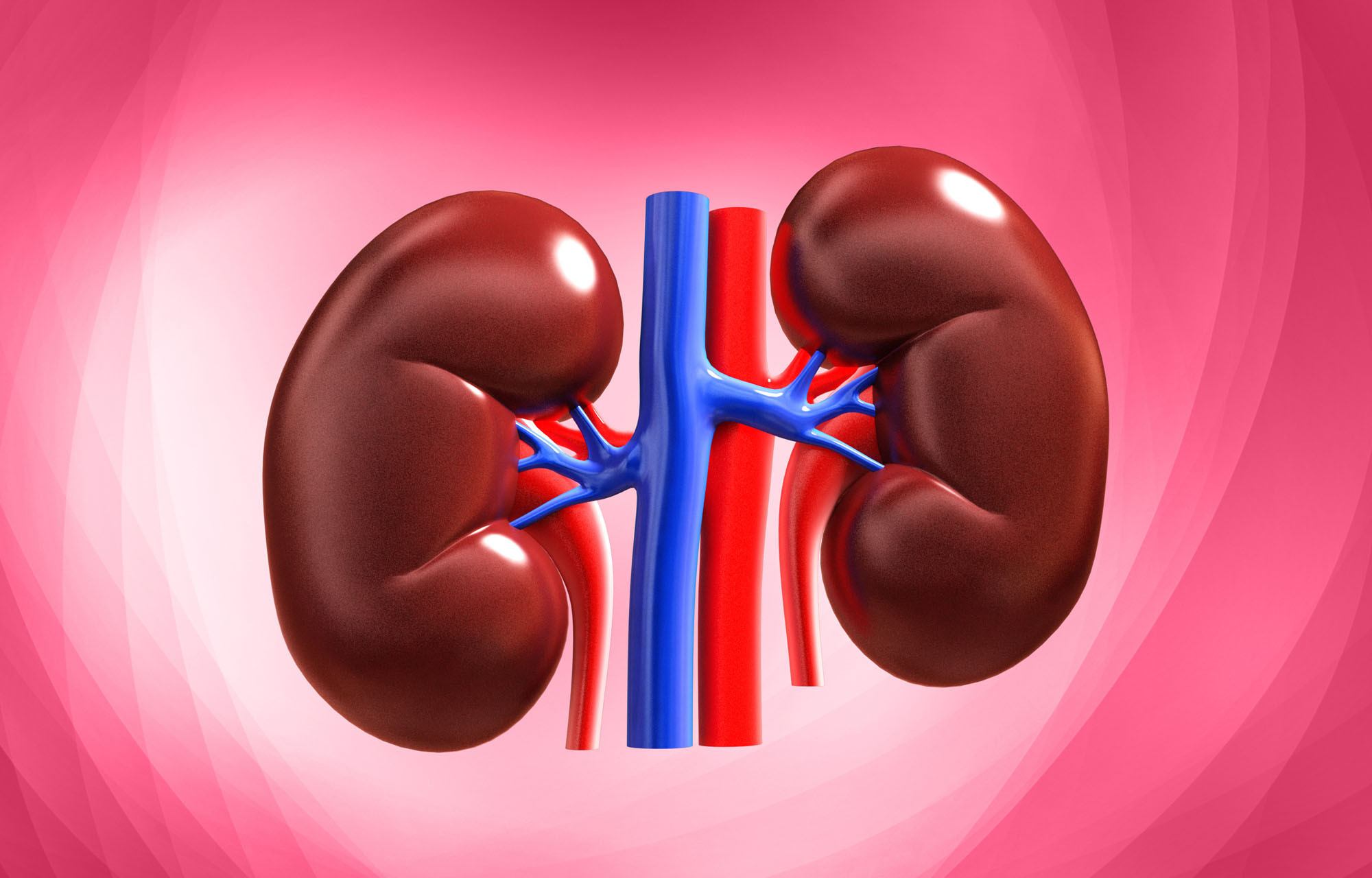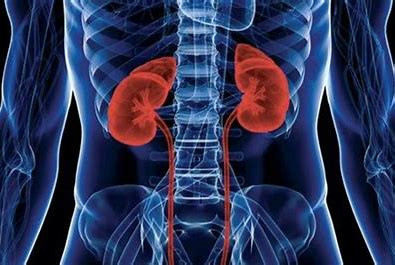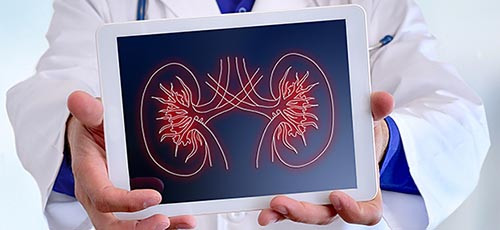Definisi
Penyakit ginjal kronis (PGK) adalah penurunan fungsi ginjal jangka panjang (kronis). Kondisi ini sering ditemukan terutama pada usia tua. Saat ini di seluruh dunia, angka pengidap PGK mencapai 843,6 juta pasien. Menurut riset kesehatan dasar tahun 2018, di Indonesia sendiri, angka pengidap PGK diperkirakan sekitar 713.000 pasien.
Terdapat 5 stadium PGK, dengan stadium 5 adalah stadium yang paling berat yang disebut gagal ginjal atau end-stage renal disease. Pasien PGK stadium 5 wajib melakukan dialisis 'cuci darah' untuk menyaring darah menjadi urin.
Penyebab
PGK biasanya adalah komplikasi dari kondisi lain yang memperberat kerja ginjal. Seringnya, PGK merupakan hasil dari kombinasi beberapa masalah kesehatan seperti:
- Tekanan darah tinggi. Seiring waktu, tekanan darah yang terus menerus tinggi dapat membebani pembuluh darah kecil pada ginjal dan menyebabkan ginjal tidak berfungsi sebagaimana mestinya
- Diabetes.Terlalu banyak glukosa atau gula pada darah dapat merusak penyaring kecil pada ginjal
- Kolesterol tinggi. Hal ini dapat menyebabkan penumpukan deposit lemak pada pembuluh darah yang menyuplai darah. Hal ini akan mempersulit ginjal untuk bekerja dengan baik
- Infeksi ginjal
- Peradangan ginjal (glomerulonefritis)
- Penyakit ginjal polikistik yaitu penyakit keturunan dimana timbul kista pada ginjal
- Sumbatan aliran urin. Sebagai contoh, batu ginjal yang berulang terus atau prostat yang membesar akan menghambat aliran urin
- Penggunaan obat-obatan tertentu dalam jangka panjang, misalnya lithium dan obat anti peradangan non-steroidal (NSAID)
Faktor Risiko
PGK dapat menyerang siapapun, namun lebih sering pada orang kulit gelap atau etnis Asia Selatan. Selain itu, adanya riwayat keluarga degnan PGK atau penyakit ginjal yang diturunkan juga merupakan faktor riskiko PGK.
Gejala
PGK dapat menyebabkan penyakit ringan dengan gejala yang minimal atau tidak bergejala, sampai berat dimana ginjal berhenti bekerja (gagal ginjal). Biasanya PGK terdeteksi saat melakukan pemeriksaan darah atau urin untuk keperluan lain, dimana didapatkan hasil yang menandakan adanya masalah pada ginjal.
Pada stadium awal, penyakit ginjal sering tidak menyebabkan gejala karena tubuh masih dapat mengkompensasi penurunan fungsi ginjal yang signifikan. Pada stadium lanjut, gejala yang dapat timbul adalah:
- Kelelahan
- Bengkak pada pergelangan kaki, kaki, atau tangan akibat penumpukan cairan
- Sesak nafas
- Mual
- Penurunan nafsu makan
- Penurunan berat badan
- Darah pada urin
- Peningkatan frekuensi berkemih, terutama saat malam hari
- Sulit tidur (insomnia)
- Kulit gatal
- Nyeri kepala
- Gangguan ereksi pada pria
Diagnosa
PGK dapat didiagnosa menggunakan berbagai pemeriksaan seperti:
- Pemeriksaan darah. Pemeriksaan utama untuk penyakit ginjal adalah pemeriksaan darah. Pemeriksaan ini digunakan untuk mencari adanya peningkatan zat buangan yang disebut kreatitinin dalam darah. Dokter akan menggunakan hasil pemeriksaan darah, usia, ukuran tubuh, jenis kelamin, dan kelompok etnis untuk menghitung berapa mililiter zat tersebut yang harus disarin goleh ginjal setiap menitnya. Perhitungan ini disebut dengan estimated glomerular filtration rate (eGFR). Ginjal yang sehat seharusnya dapat menyaring lebih dari 90 ml/menit. Jika kurang, maka kemungkinan Anda menderita PGK
- Pemeriksaan urin. Pemeriksaan ini dilakukan untuk mengecek kadar zat yang disebut albumin dan kreatinin di urin, yang disebut dengan rasio albumin:kreatinin. Selain itu, pemeriksaan ini juga untuk mengecek adanya darah dan protein pada urin. Bersama dengan eGFR, pemeriksaan urin dapat membantu memberikan gambaran yang lebih akurat dari kerja ginjal.
- Pemeriksaan lain seperti ultrasonografi (USG), MRI, dan CT scan untuk melihat struktur ginjal dan adanya sumbatan
- Biopsi ginjal. Sampel kecil jaringan ginjal akan diambil menggunakan jarum dan selnya akan diperiksa dibawah mikroskop untuk mencari adanya kerusakan.
Hasil pemeriksaan darah dan urin dapat digunakan untuk menilai stadium penyakit ginjal. Hasil tersebut menggambarkan tingkat keparahan kerusakan ginjal. Angka yang semakin tinggi menandakan PGK yang lebih serius.
Jika Anda memiliki risiko tinggi menderita PGK (misalnya, jika Anda memiliki faktor risiko seperti tekanan darah tinggi atau diabetes), maka Anda mungkin akan disarankan untuk melakukan pemeriksaan kesehatan secara rutin untuk mengecek adanya PGK sehingga kondisi ini dapat terdeteksi pada stadium dini.
Tata Laksana
Tidak ada terapi atau pengobatan untuk menyembuhkan PGK. Terapi bertujuan untuk membantu memperbaiki gejala dan memperlambat perburukan. Pilihan terapi akan. Bergantung pada tingkat keparahan penyakit. Terapi utama adalah:
- Perubahan gaya hidup untuk mempertahankan kesehatan secara umum. Perubahan gaya hidup yang direkomendasikan pada penderita PGK adalah:
- Berhenti merokok
- Pola makan sehat dan seimbang
- Membatasi asupan garam menjadi kurang dari 2 gram per hari (sekitar 1 sendok the)
- Olah raga teratur, minimal 150 menit setiap minggunya
- Mengurangi konsumsi alcohol tidak lebih dari 14 unit alcohol per minggu
- Mempertahankan berat badan ideal
- Menghindari konsumsi obat OAINS seperti ibuprofen, kecuali direkomendasikan oleh dokter. Obat-obatan ini dapat merusak ginjal jika Anda sudah memiliki penyakit ginjal
- Obat-obatan. Tidak ada obat yang spesifik untuk PGK. Obat diberikan untuk mengontrol kondisi lain yang dapat menyebabkan PGK dan untuk mengatasi komplikasi PGK. Biasanya obat digunakan untuk mengontrol tekanan darah tinggi, kolesterol tinggi, penumpukan cairan, kurang darah (anemia), masalah tulang, dan peradangan ginjal
- Dialisis (cuci darah). Pada beberapa orang dengan PGK, ginjal akan berhenti bekerja. Salah satu pilihan terapi saat PGK sudah mencapai tahap lanjut adalah dialysis. Metode ini membuang zat buangan tubuh dan kelebihan cairan dari darah.
- Transplantasi ginjal. Alternatif dari dialysis dalah transplantasi ginjal. Terapi ini sering menjadi terapi yang paling efektif untuk penyakit ginjal tahap lanjut, namun memang membutuhkan operasi besar dan konsumsi obat penekan system imun sampai seumur hidup untuk mencegah system imun menyerang organ donor.
Selain terapi di atas, Anda juga akan disarankan untuk menjalani pemeriksaan secara teratur untuk memonitor kondisi Anda. Kebanyakan penderita PGK dapat mengontrol kondisinya dengan obat-obatan dan pemeriksaan rutin.
Komplikasi
PGK dapat mempengaruhi hampir seluruh bagian tubuh. Komplikasi yang mungkin terjadi adalah:
- Penumpukan cairan, yang dapat menyebabkan pembengkakan di lengan, tungkai, paru (edema paru), serta tekanan darah tinggi
- Peningkatan kalium darah secara tiba-tiba yang dapat mengganggu fungsi jantung dan dapat mengancam nyawa
- Anemia (kurang darah)
- Penyakit jantung
- Kelemahan tulang dan peningkatan risiko patah tulang
- Menurunnya gairah seksual, gangguan ereksi, dan penurunan kesuburan
- Kerusakan system saraf pusat, yang dapat menyebabkan kesulitan konsentrasi, perubahan kepribadian, atau kejang
- Penurunan respon imun sehingga lebih rentan terhadap infeksi
- Peradangan membrane jantung (pericarditis)
- Komplikasi kehamilan yang berisiko untuk ibu dan janin
- Kerusakan ginjal ireversibel (penyakit ginjal tahap akhir atau end-stage renal disease) yang pada akhirnya akan membutuhkan dialysis ataupun transplantasi ginjal untuk mempertahankan hidup
Pencegahan
Anda dapat mencegah PGK dengan menerapkan gaya hidup yang sehat dan memastikan bahwa penyakit lain yang Anda miliki sudah terkontrol dengan baik.
Kapan Harus ke Dokter?
Anda sebaiknya berkonsultasi dengan dokter jika Anda memiliki gejala yang mengkhawatirkan atau Anda mencurigai adanya gejala penyakit ginjal. Gejala penyakit ginjal dapat disebabkan oleh banyak kondisi lain yang lebih ringan. Oleh karena itu, penting untuk mendapatkan diagnosis yang tepat.
Mau tahu informasi seputar penyakit lainnya? Cek di sini, ya!
- dr Anita Larasati Priyono
Kovesdy CP. Epidemiology of chronic kidney disease: an update 2022. Kidney International Supplements. https://doi.org/10.1016/j.kisu.2021.11.003
Chronic kidney disease - Treatment. (2022). Retrieved 4 July 2022, from https://www.nhs.uk/conditions/kidney-disease/treatment/
(2022). Retrieved 4 July 2022, from https://www.mayoclinic.org/diseases-conditions/chronic-kidney-disease/symptoms-causes/syc-20354521
(2022). Retrieved 4 July 2022, from https://www.cdc.gov/kidneydisease/basics.html









